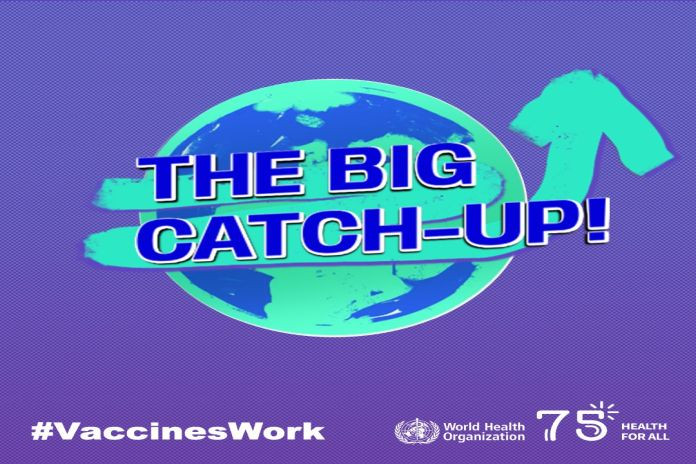- ‘The Big Catch-up’ is an extended effort to lift vaccination levels among children to at least pre-pandemic levels and endeavours to exceed those.
- Led by a broad range of national and global health partners, The Big Catch-up also aims to ensure stronger primary healthcare services for essential immunization in the future.
SWITZERLAND / USA – WHO, UNICEF, Gavi, the Vaccine Alliance and the Bill & Melinda Gates Foundation, along with Immunization Agenda 2030 and many other global and national health partners, joined forces to call for “The Big Catch-up”, a targeted global effort to boost vaccination among children following declines driven by the COVID-19 pandemic.
This effort aims to reverse the declines in childhood vaccination recorded in over 100 countries since the pandemic, due to overburdened health services, closed clinics, and disrupted imports and exports of vials, syringes and other medical supplies. Meanwhile, communities and families experienced lockdowns, restricting travel and access to services, and financial and human resources were limited along with access to health commodities, due to the emergency response. Ongoing challenges like conflicts, climate crises and vaccine hesitancy also contributed to the decline in coverage rates.
With over 25 million children missing at least one vaccination in 2021 alone, outbreaks of preventable diseases, including measles, diphtheria, polio and yellow fever are already becoming more prevalent and severe. The Big Catch-up aims to protect populations from vaccine-preventable outbreaks, save children’s lives and strengthen national health systems.
While calling on people and governments in every country to play their part in helping to catch up by reaching the children who missed out, The Big Catch-up will have a particular focus on the 20 countries where three-quarters of the children who missed vaccinations in 2021 live*.
Although global coverage levels have declined, there have also been bright spots of resilience. For example, early reports indicate India saw a strong recovery in essential immunization in 2022, while Uganda maintained high coverage levels during the pandemic. Countries have also been successful at reaching groups in vulnerable situations. In Kenya, for instance, collaborations with community health workers and local leaders have improved levels of immunization among nomadic populations in the north of the country.
To ensure progress on childhood immunization, partners are working with countries to strengthen healthcare workforces, improve health service delivery, build trust and demand for vaccines within communities, and address gaps and obstacles to restoring immunization. In addition to catching-up on childhood immunization, intensified efforts are needed to introduce the human papillomavirus (HPV) vaccine to adolescents to prevent cervical cancer, particularly in low- and middle-income countries where the burden is highest.
WHO director-general Dr Tedros Adhanom Ghebreyesus, said: “Millions of children and adolescents, particularly in lower-income countries, have missed out on life-saving vaccinations, while outbreaks of these deadly diseases have risen. WHO is supporting dozens of countries to restore immunization and other essential health services. Catching up is a top priority. No child should die of a vaccine-preventable disease.”
“Routine vaccines are typically a child’s first entry into their health system and so children who miss out on their early vaccines are at added risk of being cut out of health care in the long run,” said UNICEF executive director Catherine Russell. “The longer we wait to reach and vaccinate these children, the more vulnerable they become and the greater the risk of more deadly disease outbreaks. Countries, global partners and local communities must come together to strengthen services, build trust and save lives.”
“We cannot allow a legacy of the pandemic to be the undoing of many years’ work protecting more and more children from deadly, preventable diseases,” said Dr Seth Berkley, chief executive officer of Gavi, the Vaccine Alliance. “Global health partners, working with governments and communities, must do everything we can to protect the life of every child.”
“Vaccines are a public health triumph,” said Dr Chris Elias, president of Global Development at the Bill & Melinda Gates Foundation. “The incredible progress that has been made toward ending polio and reducing the incidence of infectious diseases is the direct result of thousands of dedicated global partners and local health workers who have worked to immunize millions of children. We must double down to reach all children with the vaccines they need to live healthier lives and ensure that future generations live free of preventable diseases like polio.”





